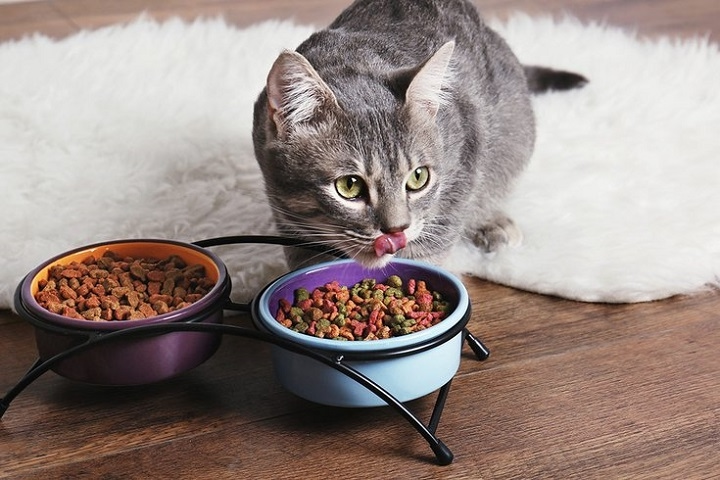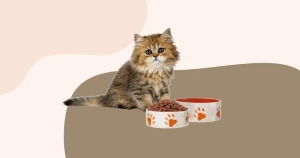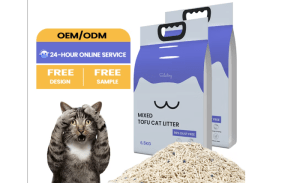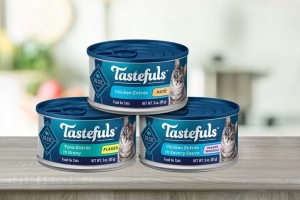Cats with sensitive stomachs can be tricky to feed. One day they love their food, the next they’re turning away or vomiting after meals. If your feline friend is struggling with frequent hairballs, loose stools, or digestive discomfort, switching to the best cat food for sensitive stomachs can make a world of difference. The right formula can help soothe irritation, support gut health, and promote overall well-being—all while keeping mealtime enjoyable.
Signs Your Cat Has a Sensitive Stomach
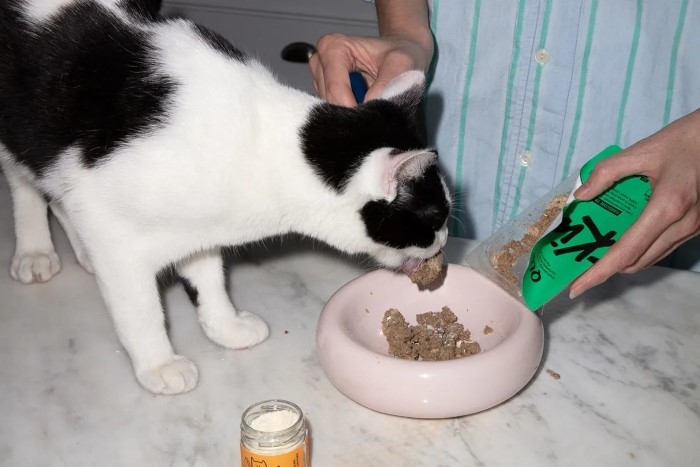
Before choosing the right food, it’s important to recognize the common symptoms of digestive sensitivity in cats. These may include:
- Frequent vomiting after meals
- Diarrhea or loose stools
- Excessive gas
- Bloating or discomfort
- Loss of appetite
- Weight loss
- Lethargy
If your cat regularly shows any of these signs, consult your veterinarian to rule out serious health conditions. Once medical issues are excluded, switching to a gentle, specially formulated diet is the next best step.
What to Look for in Cat Food for Sensitive Stomachs
Cats with sensitive stomachs need food that’s easy to digest, free from common irritants, and packed with nutrients that support gut health. Look for:
- Easily digestible proteins like chicken, turkey, lamb, or fish
- Limited ingredient diets (LID) to reduce potential allergens
- Prebiotics and probiotics to aid digestion
- No artificial additives or preservatives
- No dairy, soy, corn, or wheat, which are common culprits
- Moisture-rich options (wet or brothy foods) to aid hydration and digestion
Best Cat Foods for Sensitive Stomachs (Top Picks)
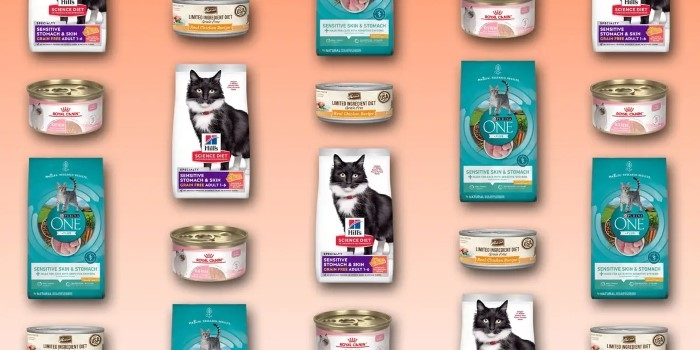
Here are some of the best vet-recommended and cat parent-approved cat foods specifically formulated for sensitive stomachs:
Hill’s Science Diet Sensitive Stomach & Skin
A popular veterinary-recommended option, this formula is made with easy-to-digest chicken and packed with prebiotic fiber and vitamin E. It promotes gentle digestion and also improves skin and coat health.
Available in both dry and wet versions.
Key benefits:
- Veterinarian-recommended
- Prebiotic fiber for gut health
- Helps reduce hairballs and vomiting
Purina Pro Plan Sensitive Skin & Stomach
This high-protein formula features real turkey or lamb as the first ingredient, plus rice for easy digestion. It includes omega fatty acids for skin health and prebiotics to support beneficial gut bacteria.
Key benefits:
- High-quality protein source
- Gentle on the stomach
- Great for food-sensitive cats with skin issues
Royal Canin Digest Sensitive Loaf in Sauce (Wet Food)
Royal Canin’s Digest Sensitive wet food offers high digestibility and reduced stool odor. Its soft, pâté-like texture is perfect for cats with dental or gastrointestinal issues.
Key benefits:
- Designed for cats with delicate digestion
- Moisture-rich to support hydration
- Supports optimal stool quality
Blue Buffalo Basics Limited Ingredient Diet (LID)
Perfect for cats with food allergies or intolerances, this recipe uses a single animal protein source (like duck or turkey) and simple, digestible carbs such as potatoes or peas.
Key benefits:
- No corn, wheat, soy, or dairy
- Great for identifying food triggers
- Supports immune and digestive systems
Instinct Limited Ingredient Diet Grain-Free Recipe
This high-protein, grain-free food is made with a single source of animal protein and one vegetable. It’s ideal for elimination diets or cats with ingredient sensitivities.
Key benefits:
- Freeze-dried raw-coated kibble for flavor
- Very limited ingredients
- High in animal protein
Weruva Cats in the Kitchen (Wet Food)
For cats that prefer wet food, Weruva offers high-moisture, grain-free recipes made with human-grade ingredients. It’s known for its digestibility and flavor appeal.
Key benefits:
- Shredded meat in broth
- Ideal for hydration and digestion
- Free of gums and artificial fillers
I and Love and You Naked Essentials (Grain-Free)
A natural, grain-free kibble made with prebiotics and probiotics to help digestion. It’s poultry-free too—making it great for cats allergic to chicken.
Key benefits:
- Affordable and allergy-friendly
- Includes added digestive enzymes
- Poultry-free options available
Tips for Switching to Sensitive Stomach Cat Food
Transitioning your cat to new food too quickly can cause further stomach upset. Here’s how to switch safely:
- Days 1–3: Mix 25% new food with 75% current food
- Days 4–6: 50% new, 50% current
- Days 7–9: 75% new, 25% current
- Day 10: 100% new food
Always keep fresh water available and monitor your cat’s reaction during the transition period. Improvement should show within 1–2 weeks.
When to See a Vet
If dietary changes don’t resolve the symptoms, or your cat experiences:
- Persistent vomiting
- Bloody stools
- Extreme lethargy
- Significant weight loss
- Refusal to eat
Visit a veterinarian immediately. These could signal underlying health issues like pancreatitis, parasites, IBD, or kidney disease.
Choosing the best cat food for sensitive stomachs can significantly improve your cat’s quality of life. The right recipe offers more than just nourishment—it brings comfort, better digestion, and a happier, healthier feline. Whether you go for a vet-recommended kibble, a limited-ingredient diet, or moisture-rich wet food, always opt for quality, simplicity, and ingredients that support gentle digestion.
Every cat is unique, so finding the perfect match might take a little trial and error—but once you find the right food, both you and your cat will feel the difference.

